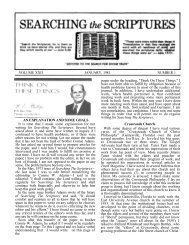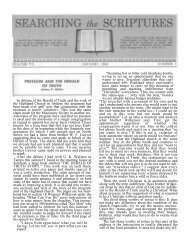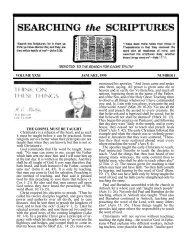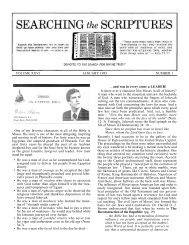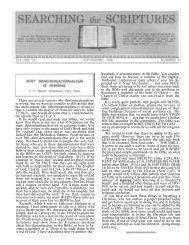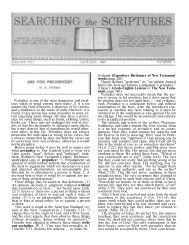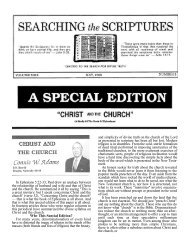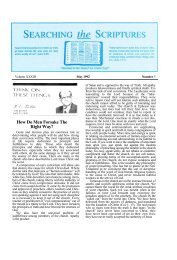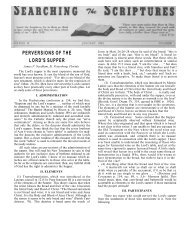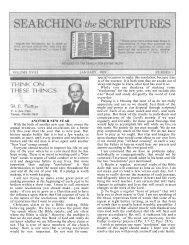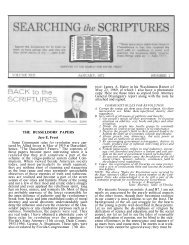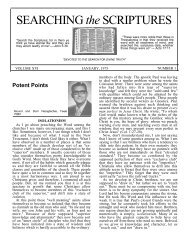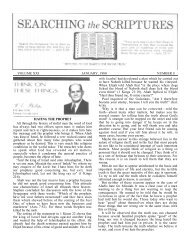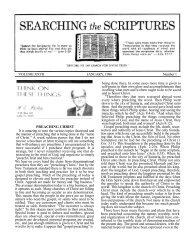Volume 29 – 1988 (PDF) - Searching The Scriptures
Volume 29 – 1988 (PDF) - Searching The Scriptures
Volume 29 – 1988 (PDF) - Searching The Scriptures
You also want an ePaper? Increase the reach of your titles
YUMPU automatically turns print PDFs into web optimized ePapers that Google loves.
SIGN-LANGUAGE<br />
QUESTION: 7s it scriptural for a church to hire a<br />
brother to translate the sermons of the preacher into signlanguage<br />
for the deaf? A member opposes this because he<br />
says we cannot be sure whether the truth is being translated.<br />
Too, what about a woman sitting in the pew and<br />
translating the sermon by sign-language to a member of<br />
her family?<br />
ANSWER: <strong>The</strong> querist has two questions for consideration.<br />
<strong>The</strong> answer to both is: Yes, it is scriptural! <strong>The</strong><br />
deaf need edification from the word of God as much as<br />
any other member. What if we attended a church comprised<br />
mainly of deaf people, and the preacher spoke<br />
exclusively in sign-language? Would not we need, and<br />
want, an interpreter? How would we like it if one of the<br />
deaf brethren opposed an interpreter for us on the basis<br />
that he wasn't sure the truth was being translated?<br />
When preachers move to non-English speaking countries<br />
to evangelize, most of the time they need interpreters<br />
until they learn the language. Is not this the same in<br />
principle as having an interpreter for the deaf? How do<br />
we know the truth is being translated by a foreign<br />
interpreter, except by the competence of and the trust<br />
we have in the translator? Churches put their confidence<br />
in the evangelists they support in foreign fields<br />
that truth will be preached, and we ought to do the same<br />
with translators.<br />
How do we who are not deaf know truth is being<br />
taught when the preacher speaks in plain English? By<br />
using our Bibles and proving all things (Acts 17:11; I<br />
<strong>The</strong>ss. 5:21; 1 Jn. 4:1). Why can't the deaf do the same<br />
thing? To oppose sign-language for the deaf for the<br />
reason given in the question above is to project all deaf<br />
people as being somewhat stupid; that those who hear<br />
have to decide whether the deaf are receiving the truth<br />
or not. This is getting close to self-righteous snobbery.<br />
As to a woman sitting in the pew, translating a<br />
sermon to one of her family by sign-language, she has<br />
violated no New Testament principle. She is not exercising<br />
authority over men which 1 Tim. 2:12 prohibits.<br />
Quietly and subordinately, she is enabling a son or<br />
daughter or grandchild to receive the word of God. I<br />
wonder if a few brethren wouldn't complain if the<br />
woman wrote it down on paper instead of translating it<br />
by sign-language. Certainly, such activity should be in<br />
an area of the building where it would not distract<br />
others, or done in a manner that would not disturb<br />
others.<br />
Page 5<br />
Paul states,"... seek that ye may excel to the edifying<br />
of the church" (1 Cor. 14:12).<br />
STUDIES IN FIRST AND SECOND TIMOTHY 2<br />
Tim. 1<br />
Second Timothy is evidently Paul's last letter, written<br />
from a Roman prison, shortly before his death. <strong>The</strong><br />
letter begins with some Personal Facts About Paul<br />
and Timothy (v. 1-5)<br />
Paul, as he often did, begins this letter with an<br />
affirmation of his apostleship. <strong>The</strong>re were those who<br />
questioned his having the authority of an apostle, so he<br />
frequently affirmed and defended it (See 1 Cor. 9:1-2;<br />
1:1). It was not something he had assumed, or even<br />
sought after, but a position for which he was selected<br />
and appointed by God. (See Acts 26:12-18; Gal. 1:11-20;<br />
2:6). <strong>The</strong> mission God had for Paul was to make men see<br />
and understand "the promise of life which is in Christ<br />
Jesus."<br />
<strong>The</strong> letter is written to Timothy, one highly commended,<br />
loved, and appreciated by the apostle. He is<br />
addressed as "my dearly beloved son." Timothy's natural<br />
parents had given him physical life, but it was Paul,<br />
on his first missionary tour, who converted Timothy,<br />
enabling him to experience life (spiritual) in Christ<br />
Jesus. In 1 Tim. 1:2 Paul refers to him as "my own son<br />
in the faith." <strong>The</strong> Corinthians, who had been begotten by<br />
Paul through the gospel (converted) had Paul as their<br />
father in this sense (1 Cor. 4:15).<br />
Pauls great love for Timothy is declared as he prays<br />
for the grace, mercy, and peace of God and Christ to be<br />
with him. Every remembrance of Timothy called forth<br />
sincere prayers of thanksgiving to God for him night and<br />
day. Remembering, thinking about, or seeing Timothy<br />
gave Paul great joy, and the feeling was mutual. Timothy,<br />
evidently openly shed tears at their separation and<br />
in manifesting concern for Paul's plight, which was a<br />
touching remembrance for Paul. <strong>The</strong> basis for this<br />
affection was "the unfeigned faith" that was in Timothy,<br />
even going back to his mother and grandmother.<br />
Exhortations to Endurance and Faithfulness (v.<br />
6-14)<br />
Let us remember that whatever is involved in endurance<br />
and faithfulness is essential to the preacher saving<br />
himself and those who hear (1 Tim. 4:16). Every saint<br />
engaged in trying to save self and others must look upon<br />
these exhortations as essentials to his success.



